Swedish word of the day: brasa

Today we've chosen a word that is especially appropriate for this time of year.
Brasa means "fire", but is a bit different to the two more common Swedish words for "fire": eld and brand.
To understand when to use which word, remember that eld refers to smaller, controlled fires (for example in a fireplace) or to fire in general (for example in the Swedish translation of A Song of Ice and Fire, Sagan om is och eld) and brand refers to larger, uncontrolled fires, such as a skogsbrand (forest fire) or gräsbrand (grass fire).
You'll also use eld in the phrase sätta eld på (to set fire to), even if you're talking about a fire which develops into a brand.
That brings us to brasa. There's a bit of an overlap with eld, because a brasa is a controlled fire. You can use it to talk about an indoor fire in a fireplace, but it's most commonly used to talk about bonfires, or outdoor wood fires.
The Swedish celebration most closely associated with bonfires is Walpurgis, a festival held on April 30th with its roots in older pagan rituals. Fire played a big part in this start-of-spring celebration, and was intended to ward off bad spirits, cleanse the land and ensure fertility during the summer.
These bonfires are often called majbrasor (May fires) because of the May 1st public holiday the following day.
Multilingual readers might notice a link to Spanish and Portuguese, in which brasa means "embers". In all three cases, brasa probably comes from the French word la braise (embers), which is related to the English term "braise", as in "braised meats" and has a Germanic origin.
Brasa actually has a second meaning in colloquial Swedish: it's a slang term for "bottom/backside". It exists in the expression ta dig i brasan (literally "touch your bottom") which first appeared in written Swedish in a 1930 book by Bengt Ljusdal, at which time it was an extremely scandalous thing to say. It's still a phrase best avoided, as are other variants such as ta dig i rumpan or ta dig i röven.
But when you're talking about a bonfire, brasa is the word to use.
Examples
Det är dags att tända brasan
It's time to light the bonfire
I Sverige firar man valborg med brasor
In Sweden, people celebrate Walpurgis with bonfires
Villa, Volvo, Vovve: The Local’s Word Guide to Swedish Life, written by The Local’s journalists, is available to order. Head to lysforlag.com/vvv to read more about it. It is also possible to buy your copy from Amazon US, Amazon UK, Bokus or Adlibris.
Comments
See Also
Brasa means "fire", but is a bit different to the two more common Swedish words for "fire": eld and brand.
To understand when to use which word, remember that eld refers to smaller, controlled fires (for example in a fireplace) or to fire in general (for example in the Swedish translation of A Song of Ice and Fire, Sagan om is och eld) and brand refers to larger, uncontrolled fires, such as a skogsbrand (forest fire) or gräsbrand (grass fire).
You'll also use eld in the phrase sätta eld på (to set fire to), even if you're talking about a fire which develops into a brand.
That brings us to brasa. There's a bit of an overlap with eld, because a brasa is a controlled fire. You can use it to talk about an indoor fire in a fireplace, but it's most commonly used to talk about bonfires, or outdoor wood fires.
The Swedish celebration most closely associated with bonfires is Walpurgis, a festival held on April 30th with its roots in older pagan rituals. Fire played a big part in this start-of-spring celebration, and was intended to ward off bad spirits, cleanse the land and ensure fertility during the summer.
These bonfires are often called majbrasor (May fires) because of the May 1st public holiday the following day.
Multilingual readers might notice a link to Spanish and Portuguese, in which brasa means "embers". In all three cases, brasa probably comes from the French word la braise (embers), which is related to the English term "braise", as in "braised meats" and has a Germanic origin.
Brasa actually has a second meaning in colloquial Swedish: it's a slang term for "bottom/backside". It exists in the expression ta dig i brasan (literally "touch your bottom") which first appeared in written Swedish in a 1930 book by Bengt Ljusdal, at which time it was an extremely scandalous thing to say. It's still a phrase best avoided, as are other variants such as ta dig i rumpan or ta dig i röven.
But when you're talking about a bonfire, brasa is the word to use.
Examples
Det är dags att tända brasan
It's time to light the bonfire
I Sverige firar man valborg med brasor
In Sweden, people celebrate Walpurgis with bonfires
Villa, Volvo, Vovve: The Local’s Word Guide to Swedish Life, written by The Local’s journalists, is available to order. Head to lysforlag.com/vvv to read more about it. It is also possible to buy your copy from Amazon US, Amazon UK, Bokus or Adlibris.
Join the conversation in our comments section below. Share your own views and experience and if you have a question or suggestion for our journalists then email us at [email protected].
Please keep comments civil, constructive and on topic – and make sure to read our terms of use before getting involved.
Please log in here to leave a comment.